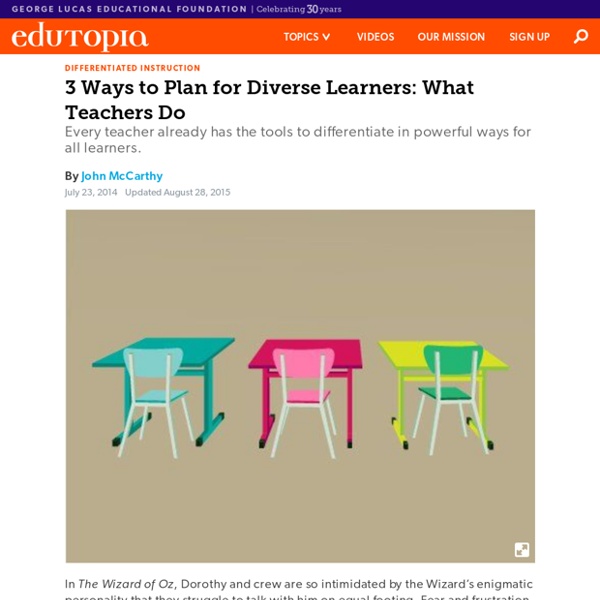Assessment Instruments for Use with Students from Culturally and Linguistically Diverse Backgrounds
Compiled by Olaya Landa-Vialard, Ed.D., CTVI Contents Criterion-Referenced Assessment: Curriculum-Based Assessment:
Apps to Support Diverse Learners in the Classroom
Do you like apps? Do you use them in the classroom? Not every district, school, or parent has the ability to support apps in the day-to-day learning environment, but for those that can, there are some fun, effective, tried-and-true apps that can make a tremendous difference in the lives of diverse learners. Many states now require incorporating technology into standardized testing, so the number of systems with the ability and willingness to support apps and software is also increasing. Many teachers and parents enjoy apps just as much as students.
Five Ways Teachers Can Use Technology to Help Students
Thomas Edison once said, “Books will soon be obsolete in the public schools…our school system will be completely changed inside of ten years.” Amazingly enough, however, one of our nation’s most important inventors was proven quite wrong. The American education system has a remarkable resistance to innovation and the classroom experience has changed very little in the 100 years since Edison’s prediction. Advances in information technology have revolutionized how people communicate and learn in nearly every aspect of modern life except for education. The education system operates under the antiquated needs of an agrarian and industrial America.
Early Reading Assessment: A Guiding Tool for Instruction
Click the "References" link above to hide these references. Armstrong, Thomas (1994). Multiple intelligences in the classroom. Alexandria, VA: Association for Supervision and Curriculum Development. Balanced Reading.com. Retrieved November 16, 2004, from:
The Best Free Online Tools For ELLs To Use For Assessing Their Language-Level
I’ve written a lot about research that finds having students self-assess regularly and see their own improvement can be a great self-motivating strategy. There are lots of ways to apply that idea in the classroom: having students compare essays they wrote at the beginning of the year to those they write several months later; having them check-off which words on a list they know or don’t know prior to a beginning a unit, and then having them revisit the list at the end, etc. I’ve also had students record themselves reading a text, upload it to our class blog, and then have them make another recording months later. Another online way to implement this strategy is through the multiple simple and free “tests” that are available for students to evaluate their English-language level.
Using Informal Assessments for English Language Learners
Informal assessments (also called authentic or alternative) allow teachers to track the ongoing progress of their students regularly and often. While standardized tests measure students at a particular point in the year, ongoing assessments provide continual snapshots of where students are throughout the school year. By using informal assessments, teachers can target students' specific problem areas, adapt instruction, and intervene earlier rather than later. Ongoing assessments are particularly important for English language learners (ELLs).
The Problem: Prevalence - Trauma Sensitive Schools
Studies now show that nearly every school has children who have been exposed to overwhelming experiences, such as witnessing violence between their caretakers, being the direct targets of abuse, and other kinds of adversity. The Adverse Childhood Experiences (ACE) study found higher levels of traumatic experiences in the general population than previously imagined. Among the approximately 17,000 adults surveyed, just over 50% reported having experienced at least one form of childhood adversity. These included physical, emotional or sexual abuse; witnessing their mother treated violently; having a parent with substance abuse or mental health issues; or, living in a household with an adult who had spent time in prison. Experts explain that trauma is not an event itself, but rather a response to one or more overwhelmingly stressful events where one’s ability to cope is dramatically undermined.
International Literacy Association
For more than 60 years, the International Literacy Association has championed rigorous research as the foundation for literacy leadership, and we have developed research-based standards for preparing and certifying literacy professionals. Standards for the Preparation of Literacy Professionals 2017 Standards for Reading Professionals-Revised 2010 Standards for Middle and High School Literacy Coaches Standards for the Assessment of Reading and Writing
Guideline on Expanding Opportunities: Academic Success for Culturally and Linguistically Diverse Students
Prepared by the members of the 1986 Task Force on Racism and Bias in the Teaching of English The age of specialization has often encouraged educators to create separate and remedial ways of teaching culturally and linguistically diverse students. This trend has led to the development of special books, programs, courses, and methods for such students. Some of these curricular approaches have impeded, rather than fostered, their intellectual and linguistic growth. How can educators reverse this miseducation and develop responsible ways to meet the needs of these students?



